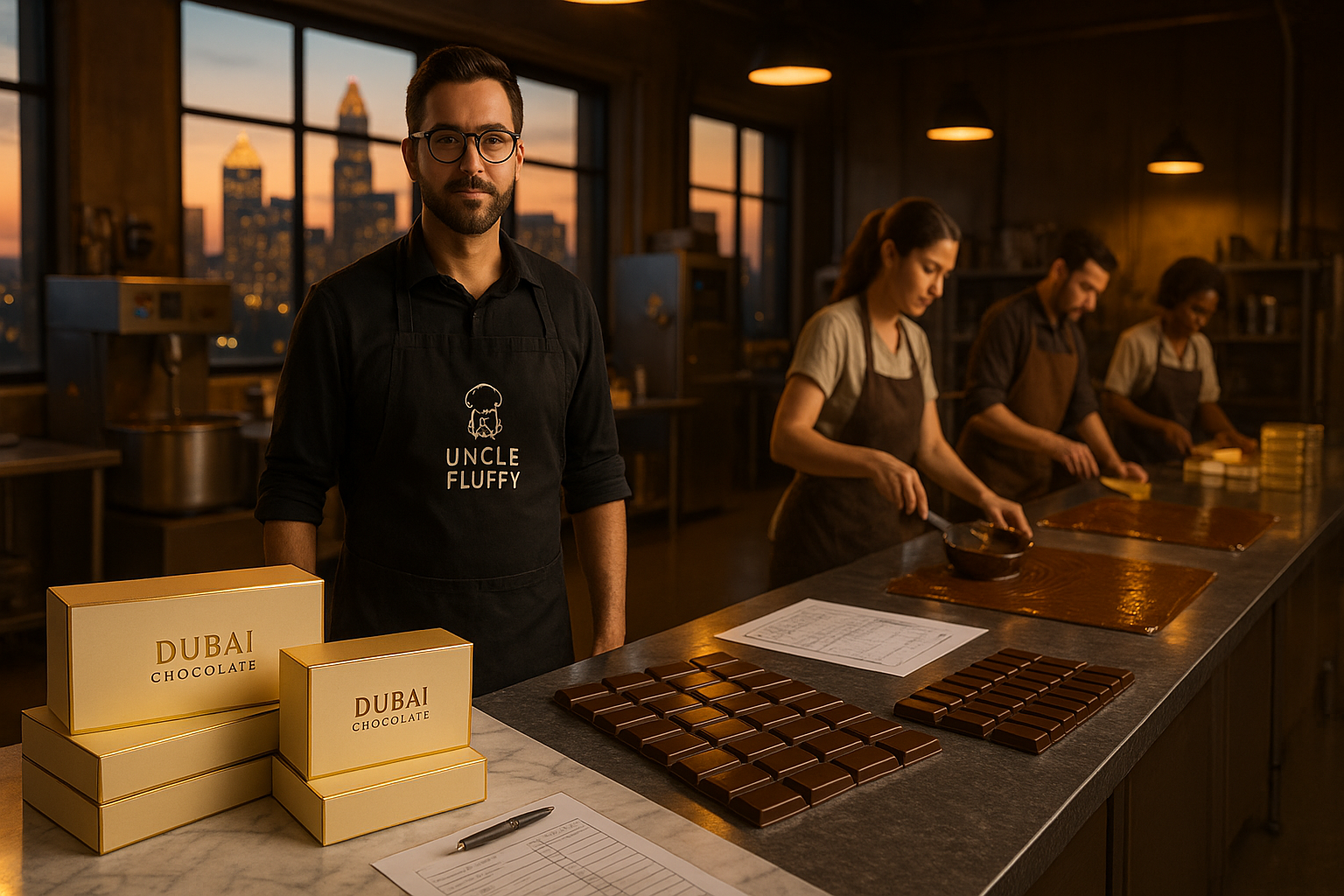The Sweet Opportunity: Chocolate Manufacturing in North Carolina
North Carolina has quietly become one of America’s rising hubs for artisanal chocolate production and dessert entrepreneurship. With its strong agricultural base, growing tourism economy, and supportive small business environment, the state offers an ideal setting for launching a premium chocolate manufacturing business.
Whether you’re based in Charlotte, Raleigh, Greensboro, or Asheville, North Carolina’s mix of innovation and affordability creates the perfect foundation for producing high-end chocolate products — especially if inspired by the Dubai Chocolate model, a global luxury brand developed by Uncle Fluffy.
This guide will walk you through how to manufacture chocolate in North Carolina — from legal setup to equipment, recipes, packaging, and market strategies — and explain how the Dubai Chocolate Startup Package can help you start production in just 30 days.
Step 1: Understanding the Chocolate Manufacturing Process
Before starting, it’s essential to understand the fundamentals of chocolate production. The process involves several key steps that transform cacao beans into smooth, glossy, and flavorful chocolate bars.
1. Sourcing Cacao Beans
Choose high-quality cacao from ethical suppliers. North Carolina manufacturers like Videri Chocolate Factory and French Broad Chocolate use direct-trade beans from Latin America and Africa.
2. Roasting
Beans are roasted to develop flavor and aroma. Temperatures typically range between 250°F–275°F.
3. Cracking & Winnowing
Roasted beans are cracked open and husks removed, leaving cacao nibs.
4. Grinding & Refining
Nibs are ground into a fine paste (cocoa liquor) using melangers or stone grinders, then refined for texture.
5. Conching
Chocolate is continuously mixed and aerated to smooth out bitterness and enhance flavor.
6. Tempering
The chocolate is heated and cooled in precise cycles to create the signature glossy finish and snap.
7. Molding & Cooling
Tempered chocolate is poured into molds, cooled, and packaged for sale.
This process can sound complex, but modern turnkey systems like the Dubai Chocolate Startup Package include pre-calibrated machines and detailed training that make manufacturing simple and precise.
Step 2: Register and License Your Chocolate Manufacturing Business
To manufacture chocolate in North Carolina legally, follow these key administrative steps:
1. Register Your Business
File your business entity (LLC or corporation) with the North Carolina Secretary of State.
2. Obtain Necessary Licenses
o Food Manufacturer License from the North Carolina Department of Agriculture & Consumer Services (NCDA).
o Sales and Use Tax Permit from the NC Department of Revenue.
o Local Business License (varies by city or county).
3. Comply with Food Safety Regulations
o Follow FDA Good Manufacturing Practices (GMP).
o Keep detailed cleaning and temperature control records.
o Ensure labeling compliance (nutrition facts, allergen info, and expiration date).
The Dubai Chocolate Startup Package simplifies this process by providing label templates, nutrition testing guidance, and legal training modules for U.S. compliance.
Step 3: Choose Your Production Facility
Depending on your scale, you can choose one of the following setups:
|
Setup Type |
Description |
Ideal For |
|
Home Kitchen (Cottage Food Law) |
Produce limited non-perishable chocolates from home for local sales. |
Testing recipes & small markets. |
|
Shared Commercial Kitchen |
Rent a certified kitchen hourly or monthly. |
Startups with small-scale production. |
|
Private Commercial Facility |
Build or lease your own chocolate production site. |
Large-scale manufacturing and wholesale distribution. |
North Carolina cities like Raleigh and Charlotte have several certified shared kitchens available.
If you choose the Dubai Chocolate system, your package includes equipment shipped directly to your location — perfect for small or medium-scale production without heavy capital investment.
Step 4: Invest in Chocolate Manufacturing Equipment
Manufacturing high-quality chocolate requires precision tools. Here’s the basic list every chocolatier needs:
- Tempering Machine – Ensures chocolate is smooth and shiny.
- Melanger / Grinder – For refining cocoa nibs into a smooth paste.
- Vibration Table – Removes air bubbles and improves mold quality.
- Cooling System – Maintains temperature control for solidification.
- Molds & Trays – For shaping your chocolate bars.
- Digital Thermometer & Weighing Scale – For accuracy in recipes.
The Dubai Chocolate Startup Package includes all of these, pre-selected and tested for optimal results. The equipment arrives ready to plug and use, with full video installation tutorials.
Step 5: Master the Recipes
Creating your own signature chocolate flavors is where creativity meets science. You can experiment with local ingredients or draw inspiration from Dubai’s international flavors.
Popular Dubai Chocolate Flavors You Can Manufacture Locally:
- Pistachio & Kunafa — A signature Middle Eastern fusion with crunchy textures.
- Caramel Biscuit Crunch — A best-seller inspired by Dubai cafés.
- Rose & Raspberry — Perfect for gifting and luxury retail.
- Hazelnut Cream — Smooth, rich, and universally appealing.
The Dubai Chocolate Startup Package includes pre-recorded recipe training modules that cover flavor development, ingredient handling, and shelf-life extension techniques.
Step 6: Packaging and Branding
Luxury chocolate is as much about presentation as it is about taste. Dubai Chocolate’s global appeal lies in its elegant gold-and-cream packaging, sophisticated logos, and storytelling-driven design.
Tips for Packaging Success:
- Use high-quality, food-grade wrapping materials.
- Ensure designs include your logo, ingredients, and storage instructions.
- Consider adding Dubai-inspired elements like gold foils, Arabic calligraphy, or luxury textures.
- Always follow FDA labeling laws for U.S. compliance.
The Dubai Chocolate Startup Package provides custom branding, logo design, and packaging templates, helping you create a premium brand from day one.
Step 7: Distribution and Sales in North Carolina
Once production is ready, choose the right distribution strategy for your market:
1. Retail Distribution
Sell your chocolate in cafés, bakeries, and boutique stores in Charlotte, Raleigh, or Asheville.
2. Online Sales
Use your Shopify-ready website (included in the Dubai Chocolate package) to sell directly to consumers nationwide.
3. Corporate & Event Gifting
Partner with hotels, wedding planners, and event organizers for bulk chocolate gifting.
4. Tourism Outlets
Target souvenir stores, airport shops, and local tourism centers — a high-margin segment in cities like Wilmington and Asheville.
Step 8: Marketing Your Dubai Chocolate Brand
Marketing is where the Dubai Chocolate experience shines. With over 3 million global followers, Uncle Fluffy has proven the power of storytelling and design in dessert marketing.
Effective Marketing Strategies for North Carolina:
- Showcase Dubai-inspired visuals on Instagram and TikTok.
- Partner with local influencers or food bloggers.
- Highlight your brand story: “Luxury chocolate handcrafted in North Carolina, inspired by Dubai’s elegance.”
- Offer tasting events or factory tours for exposure.
Through co-branded promotions, Dubai Chocolate entrepreneurs can leverage Uncle Fluffy’s global audience to gain instant credibility and visibility.
Step 9: Scale and Expand
Once you’ve established consistent production and sales, expand through:
- Wholesale distribution to retailers across neighboring states.
- Private labeling for local cafés or hotels.
- Franchise model under your brand using the same Dubai Chocolate system.
The Dubai Chocolate Startup Package also includes sales training and supplier directories to help you expand sustainably.
Profit Example: Dubai Chocolate Manufacturing Business
|
Scale |
Monthly Bars Sold |
Revenue (USD) |
Profit (USD) |
|
Starter |
3,000 |
$36,000 |
$27,000 |
|
Growth |
10,000 |
$120,000 |
$90,000 |
|
Expansion |
30,000 |
$360,000 |
$270,000 |
(Average cost per bar: $3 / retail price: $12)
FAQs About Chocolate Manufacturing in North Carolina
Q1: Do I need a license to manufacture chocolate in North Carolina?
Yes. You need a Food Manufacturer License from the NCDA and must comply with FDA food labeling and safety standards.
Q2: How much does it cost to set up a chocolate factory?
Small-scale setups cost $50,000–$150,000, but the Dubai Chocolate Startup Package allows full setup for around $20,000 with all tools and branding included.
Q3: Can I start from home?
Yes, under Cottage Food Laws, but production is limited. For commercial scale, a certified kitchen is required.
Q4: How long does it take to start manufacturing?
With standard equipment and licensing, it can take 3–6 months. The Dubai Chocolate Startup Package shortens this to 30 days.
Q5: What’s the shelf life of Dubai Chocolate?
Typically 2–3 months with preservatives, or 1–2 weeks without — depending on storage conditions (18–22°C, dry environment).
Schema Suggestions
- Product Schema: Dubai Chocolate Startup Package (price: USD 20,000; includes equipment, branding, training, and Shopify setup).
- FAQ Schema: Based on the Q&A section above.
- Organization Schema: Uncle Fluffy (Founded 2017, Dubai; 30+ branches; 3M+ followers).
- Article Schema: “How to Manufacture Chocolate in North Carolina,” author: Alaa Mohra, publisher: Uncle Fluffy Dubai Chocolate Blog.
Start Your Own Dubai Chocolate Business >
We can help you:
We can ship to you everything you need to start your own Dubai Chocolate business in 30 days, a complete business-in-a-box that gives you everything to launch instantly: recipes, equipment, branding, packaging, training, suppliers, and marketing support. It’s a proven viral product tied to Dubai’s prestige, designed to cut risk, save time, and let you own a ready-made business with global appeal.
Contact us now



